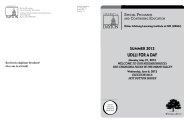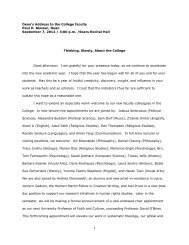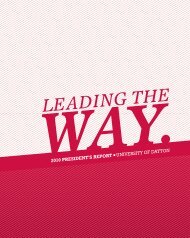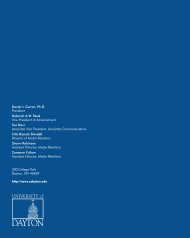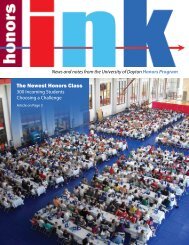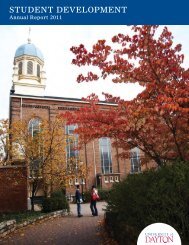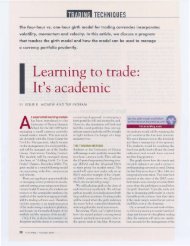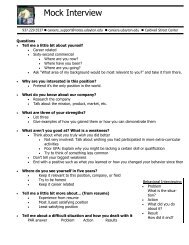Stander Symposium abstract book - University of Dayton
Stander Symposium abstract book - University of Dayton
Stander Symposium abstract book - University of Dayton
Create successful ePaper yourself
Turn your PDF publications into a flip-book with our unique Google optimized e-Paper software.
9:00 AM to 10:30 AM<br />
Efficiency, Adequacy, and Equity in Educational Funding: A Review <strong>of</strong> the Literature<br />
Presenter(s): Grace M Callahan<br />
Advisor(s): Patricia M Hart<br />
Teacher Education - Honors Thesis<br />
The public education system has recently been undergoing many changes, with new policies such as No Child Left Behind, an increased focus on<br />
high states testing, and the implementation <strong>of</strong> value added teacher evaluations; the ultimate goal being to raise achievement levels for public<br />
school students. In the midst <strong>of</strong> all <strong>of</strong> these changes, educational funding has become an important issue, with average per pupil expenditures<br />
growing from $6,663 in 1982-83 to $11,470 in 2004-05 (Grubb, 2009, p. 2). In response to the spending changes, many have studied whether or<br />
not there is in fact a correlation between school expenditures and student achievement. The question has become more and more important and<br />
controversial over the past few years, because the data gained from studies attempting to find an answer has an impact on policy, yet a definitive<br />
one has not been found. My purpose is to investigate the various reports on this topic to discover if any definite conclusions can be derived from<br />
the data. I will be reviewing the methodologies used to collect data and the analyses <strong>of</strong> the data presented. I will also draw upon other authors<br />
who have written about this topic and review their opinions and ideas. A theme that many researchers are beginning to agree on is that the use<br />
<strong>of</strong> educational funds is much more important than the amount, so I will also discuss the thoughts on how allocation <strong>of</strong> resources might be more<br />
affective in producing the desired result <strong>of</strong> increased student achievement.<br />
Factors that Promote Long-term Memory in the American High School Mathematics<br />
Classroom<br />
Presenter(s): Amanda E Morel<br />
Advisor(s): Kathryn A Kinnucan-Welsch<br />
Teacher Education - Independent Research<br />
Long-term memory in mathematics is key for success in college and the expanding technical environment that we live in. High school is the vital<br />
time when the building blocks <strong>of</strong> advanced math are taught. This research will present the most effective factors that promote long-term memory<br />
in the American high school mathematics classroom. Many educators strive to find applicable teaching strategies that will assist students in<br />
storing mathematical concepts in the students’ long-term memory. Research has suggested that creating an engaging environment, increasing<br />
the motivation and confidence in students, creating an âactive-sense making <strong>of</strong> the math materialâ, and proposing challenging and stimulating<br />
questions to the math student, will promote the long-term memory in the American high school mathematics classroom. Each <strong>of</strong> these areas are<br />
explored by interviewing leading researchers in teaching mathematics and brain retention and published literature.<br />
Responding to Challenging Behaviors in a Preschool Setting<br />
Presenter(s): Jamie L Dell<br />
Advisor(s): Patricia M Hart<br />
Teacher Education - Honors Thesis<br />
The purpose <strong>of</strong> this Behavior Change Project is to demonstrate that by combining two widely accepted methods <strong>of</strong> behavior modification, a more<br />
effective outcome can be reached dealing with pre-school children that exhibit challenging behaviors. This study will take aspects <strong>of</strong> the constructivist<br />
approach which uses pro-social guidance to handle disciplinary issues and aspects from a more behaviorist approach which employs positive<br />
behavior supports. The Applied Behavior Analysis design methodology will be used to guide this study. After observing a child for two weeks and<br />
collecting baseline data, a plan will be developed to address the negative behavior. This plan will be implemented for two weeks. The intervention<br />
will be stopped and then the child will be observed to see if the child has adapted to the intervention or returns to the prior behavior. It is crucial<br />
to deal with challenging behaviors, especially at this stage in a young childâs life. If gone undirected, these habits can âinterfere with [childrenâs]<br />
learning and ability to develop relationships with peersâ (M<strong>of</strong>fett et al., 2008, p. 22). Ultimately, the goals <strong>of</strong> this endeavor are to add to the existing<br />
body <strong>of</strong> knowledge which aims to enhance the self-esteem and interpersonal relationships <strong>of</strong> young children. The <strong>Stander</strong> presentation will<br />
focus on Chapter 2 <strong>of</strong> the study, the Review <strong>of</strong> the Literature on challenging behaviors in young children, and the methods <strong>of</strong> responding to these<br />
behaviors. Work CitedM<strong>of</strong>fett, K. R., Swafà ord, M, & Richey, L. H. (2008). Merging developmentally appropriate practice with positive behavioral<br />
supports in early childhood programs. Dimensions <strong>of</strong> Early Childhood, 22 (2), 21-28. Retrieved from ERIC.<br />
62




